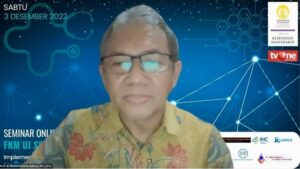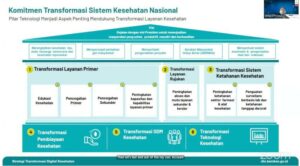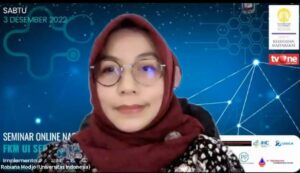Indonesia is currently working on health system transformation with one of its pillars which is digitalization in healthcare. This allows the community to access a broader range of health services, anywhere and anytime. This statement was conveyed by Dean of the Faculty of Public Health, Universitas Indonesia (FKM UI), Prof. dr. Mondastri Korib Sudaryo, M.S., D.Sc., in the National Online Seminar Series 20 of FKM UI entitled “Implementasi Transformasi Sistem Pelayanan Kesehatan Masyarakat di Era Digital” (Implementation of Public Health Service System Transformation in the Digital Age) this early December (Saturday, 3/12).

Regarding the healthcare big data interoperability system and the development of digital health transformation in Indonesia, there are three program priorities for digital transformation in healthcare that are being focused on by the Ministry of Health of Indonesia, according to Arief Faqihudin S.T. as Strategy and Planning Manager, Digital Transformation Office of the Ministry of Health, (1) Integration of individual-based medical data, (2) Digitalization and simplification of health services, and (3) Ministry of Health’s efforts to encourage the health innovation ecosystem to grow continuously. The strategic steps taken to achieve those are to realize three platforms, which are SatuSehat – an Indonesian digital healthcare service platform introduced by the Ministry of Health –, a single healthcare data dashboard, and Citizen Health App. SatuSehat is expected and intended to assist the Ministry of Health and the health innovation ecosystem related to healthcare big data interoperability systems, especially for patients in the future,” said Arief.

Professor of UI Prof. dr. Kemal N. Siregar, S.K.M., M.A., Ph.D. conveyed the importance of digitalization in primary health services, one of which is through Smart Puskesmas, which is an artificial intelligence-based primary health care system. This transformation is expected to focus on the prevention and early detection of diseases, provide personalized care, and actively involve public health center patients.
In addition, there is an application and website Halodoc, which is a telemedicine service that is widely used during the pandemic. The application becomes a link between health facility partners and the community. Generally, it takes up to 4 hours to get health services. With telemedicine, people only need 35 minutes. “The presence of our application opens access for local people to be able to enjoy the same health services as people in big cities,” said Chief of Medical Halodoc dr. Iwan Heriyanto, MARS.
The seminar, which was held by students of Occupational Safety and Health (OSH) Study Program of FKM UI, was also attended by Chief Digital Transformation Office (DTO) of the Ministry of Health Setiaji, S.T, M.Sc. This activity aims to improve health services in Indonesia with the development of digitalization and encourage understanding and awareness of health workers, academics, and the general public to actively participate in realizing the digital transformation of health services in Indonesia.
The event coordinator and FKM UI lecturer, Dr. Robiana Modjo, SKM., M.Kes., said that digital data transformation is a means of strengthening integrated healthcare data so as to increase competency literacy of human resources in the health sector and strengthen networks at the national and international levels.








